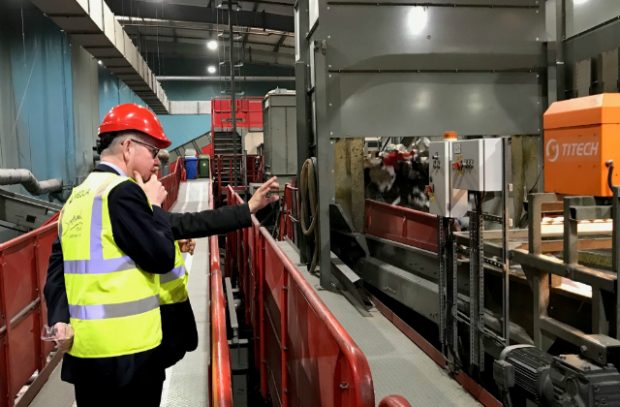Gove launches landmark blueprint for resources and waste

There is widespread national media coverage today of the launch of the Government’s landmark new Resources and Waste Strategy.
The story featured prominently in this morning’s TV and radio news bulletins, including footage of Environment Secretary Michael Gove launching the Strategy at Veolia’s recycling centre in Southwark. A number of supportive stakeholder groups were interviewed on BBC Breakfast, ITV Good Morning Britain and Sky News Sunrise, which also featured a live interview with Environment Minister Thérèse Coffey.
The Telegraph, Guardian and I newspapers all carry the story on their front pages, with further positive coverage in the Times, Express, Financial Times, Daily Mail, Independent and Daily Star.
The Strategy sets out a number of proposals to change the way we use and recycle materials. It sets out how the Government will:
- Ensure producers pay the full net costs of disposal or recycling of packaging they place on the market by extending producer responsibility – up from just 10% now.
- Review our producer responsibility schemes for items that can be harder or costly to recycle including cars, electrical goods, batteries and explore extending it to textiles, fishing gear, vehicle tyres, certain materials from construction and demolition, and bulky waste such as mattresses, furniture and carpets.
- Introduce a consistent set of recyclable materials collected from all households and businesses, and consistent labelling on packaging so consumers know what they can recycle, to drive-up recycling rates.
- Ensure weekly collections of food waste, which is often smelly and unpleasant, for every household – restoring weekly collections in some local authorities. This will be subject to consultation which will also consider free garden waste collections for households with gardens, to reduce greenhouse gas emissions from landfill
- Introduce a deposit return scheme, subject to consultation, to increase the recycling of single-use drinks containers including bottles, cans, and disposable cups filled at the point of sale.
- Explore mandatory guarantees and extended warranties on products, to encourage manufacturers to design products that last longer and drive up the levels of repair and re-use.
- Introduce annual reporting of food surplus and waste by food businesses. Should progress be insufficient, we will consult on introducing mandatory targets for food waste prevention.
- Clamp-down on illegal movements of waste at home and abroad by introducing compulsory electronic tracking of waste, and tougher penalties for rogue waste crime operators if they mislabel their waste to dodge tax rules.
Environment Secretary Michael Gove said:
Our strategy sets out how we will go further and faster, to reduce, reuse, and recycle. Together we can move away from being a ‘throw-away’ society, to one that looks at waste as a valuable resource.
We will cut our reliance on single-use plastics, end confusion over household recycling, tackle the problem of packaging by making polluters pay, and end the economic, environmental and moral scandal that is food waste.
Through this plan we will cement our place as a world leader in resource efficiency, leaving our environment in a better state than we inherited it.
A number of stakeholders have had their say on the publication, too – you can read some of these reactions in our press release on GOV.UK and Let’s Recycle is running a live blog with further responses.
Libby Peake, senior policy adviser, Green Alliance said:
It's great to see the government putting the emphasis firmly where it belongs: on resources rather than waste and on producers rather than taxpayers. Invoking the 'polluter pays' principle through wide ranging reform to producer responsibility obligations should lead manufacturers to offer more resource efficient and recyclable products and packaging.
Ending the postcode lottery of inconsistent recycling collections will mean that, when these products and packaging reach their end of life, all householders will have access to easy to understand and higher quality recycling services.
We are particularly pleased that these services will include separate food waste collection, which is a great opportunity to start addressing the scandal of wasted food. This also has the added bonus of cutting carbon, generating renewable energy and improving soils.
Check our social media channels for more content throughout the day.
December Council preparations
This week’s December Council brings together EU Member States to negotiate and agree fishing opportunities, including quota, for next year.
Aberdeen’s Press & Journal has reported that the UK Government has failed to outline its negotiating position - but UK representatives are currently in Brussels negotiating hard for UK fishermen and have been clear everyone is working to get the best deal possible.
The UK is committed to achieving sustainability in our fisheries. In parallel, we are aware of the challenges for fishermen with the full implementation of the landing obligation next year.
The UK wants to find workable solutions to choke risks arising from stocks with low or zero Total Allowable Catch (TAC), and we are keen to work with the Presidency, Commission and other Member States to do so.